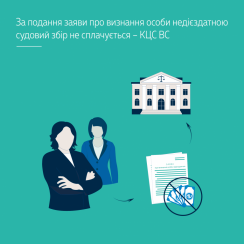Contact center of the Ukrainian Judiciary 044 207-35-46

The court of first instance left without motion the application to declare a person incapacitated and establish guardianship over him due to non-payment of the court fee.
The applicant requested that she be exempted from paying the court fee in accordance with part 2 of Article 299 of the Civil Procedural Code of Ukraine and paragraphs 5, 7 of part 1 of Article 5 of the Law of Ukraine "On Court Fees", as she was the legal representative of the person whose incapacity was being sought.
The district court ruled that the application was not submitted and returned it to the applicant. The court of appeal upheld this judgment. The courts pointed out that within the meaning of part 2 of Article 299 of the Civil Procedural Code of Ukraine, in cases on declaring an individual incapacitated, it is the state that should pay the costs associated with the consideration of the case, i.e. those specified in part 3 of Article 133 of the Civil Procedural Code of Ukraine, and not the court fee specified in part 1 of Article 133 of the Civil Procedural Code of Ukraine. The Law of Ukraine "On Court Fees" does not provide for exemption from paying court fees for filing a court application.
The Supreme Court composed of the panel of judges of the Civil Cassation Court overturned the previous judgments, remanded the case to the court of first instance for further consideration, making the following legal conclusions.
Pursuant to part 2 of Article 299 of the Civil Procedural Code of Ukraine, court costs related to the proceedings on declaring an individual incapacitated or restricting the civil capacity of an individual are borne by the state.
The above rule is specifically designed to determine whether the applicant must pay a court fee when filing such applications with the court.
It requires a systematic interpretation, since, on the one hand, by definition, court costs include court fees under part 1 of Article 133 of the Civil Procedural Code of Ukraine, and on the other hand, in cases on declaring a person incapacitated, it is the court costs set forth in part 3 of Article 133 of the Civil Procedural Code of Ukraine that are charged to the state.
Following an extended interpretation of the application of part 2 of Article 299 of the Civil Procedural Code of Ukraine, the Supreme Court concluded that all court costs, both court fees and costs related to the consideration of the case, are borne by the state in cases of separate (non-litigious) proceedings on declaring an individual incapacitated, which is consistent with the rule set forth in part 1 of Article 133 of the Civil Procedural Code of Ukraine.
In its interpretation, the Supreme Court took into account that part 3 of Article 133 of the Civil Procedural Code of Ukraine contains an exclusive list of costs related to the consideration of the case, while part 2 of Article 299 of the Civil Procedural Code of Ukraine refers specifically to court costs, which, in addition to the costs of legal aid, also include the court fee.
The application of part 2 of Article 299 of the Civil Procedural Code of Ukraine in connection with the rules of only part 3 of Article 133 of the Civil Procedural Code of Ukraine will lead to an unreasonably narrow interpretation of the applicant's procedural rights and, accordingly, to an unlawful restriction of her rights of access to court.
The Supreme Court also noted that the entry into force of the Law of Ukraine dated May 22, 2015 No. 484-VIII "On Amendments to Certain Legislative Acts of Ukraine on Payment of Court Fees", which excluded paragraph 9 of part 2 of Art. 3 of the Law of Ukraine "On Court Fees" according to which no court fee was charged for filing an application to the court for limitation of civil capacity of an individual, declaring an individual incapacitated and restoring civil capacity of an individual, cannot be a ground for charging the applicant with a court fee for filing such an application, since such a rule is provided for in part 2 of Article 299 of the Civil Procedural Code of Ukraine.
In addition, the Supreme Court stated that it had repeatedly pointed out that if the strict interpretation of a legal provision failed to provide an unambiguous answer as to whether a person had a certain right, a systematic interpretation of the legal provision should be applied. In such an interpretation, the courts should proceed from the fact that in case of such ambiguity of procedural rules of law, a natural person should rely on such an understanding of them that will not lead to a restriction of his/her procedural capabilities.
Resolution of the Supreme Court of December 14, 2022 in case No. 637/909/21 (proceedings No. 61-3489св22) - https://reyestr.court.gov.ua/Review/108025974.
This and other legal positions of the Supreme Court can be found in the Database of Legal Positions of the Supreme Court - lpd.court.gov.ua/login.